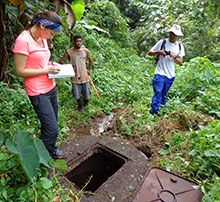
As students listen in, engineering professor Eric Hoek, (center in plaid shirt) advise Fijian villagers on how water can be transported safely from a spring deep in the jungle.
To bring 8,000 residents closer to achieving this dream, a team of five UCLA graduate students and a recent graduate, led by Eric Hoek, professor of civil and environmental engineering, traveled by bus, truck, ferry, an aging boat and even a seaplane and hiked jungle paths in July’s 100-degree heat to reach 16 villages and settlements to assess the quality of their drinking water.
The team’s goal? To determine the condition of the villages’ potable water and wastewater systems in order to submit an official Rural Water and Sanitation Plan for each village so that the people can qualify to receive funding from the Fijian government to make improvements.
“It’s not an entirely unique project; other people have done things like this before,” Hoek said modestly of the pilot project with students from the UCLA Henry Samueli School of Engineering and Applied Science and the Institute of the Environment and Sustainability. “I’ve thought about it for many years, but it’s been a neat experience to go from thinking about it to actually doing it. It really changed the way these students look at the world.”

Students James Temple (writing) and Catalina Marambio-Jones get information from Fijians about the settlement's water system.
“Fecal contamination, which is what we tested for, is not what makes you sick,” Hoek explained. “But if there are fecal coliforms there, then there’s a real possibility that other gut organisms that can make you sick might also be there.”
With fewer immunities than adults, children get sick after rainstorms hit, the team discovered in talking to residents and local health care providers. Rains flood the pit latrines, and, as the groundwater table rises, sewage is transported down into drinking water wells where the contaminated water sits on the surface.
“Most people think that Fiji has access to potable water because of the Fiji water bottles that are on store shelves,” said Michelle Thompson, a doctoral candidate in environmental science and engineering. “However, this is not the case in rural areas where they lack basic water and sanitation infrastructure.”
 Back at UCLA, the master’s and Ph.D. students are now preparing formal plans with recommendations based on their assessments. “Quite honestly, you don’t need to be an environmental engineering professor to be able to do this,” Hoek said. “It’s mostly common sense. But the villagers are used to doing things the way they have always done them. They don’t know how to do them differently. So it takes somebody from the outside to come in and say, ‘Maybe you should try this here’ and ‘Add a filter there.’”
Back at UCLA, the master’s and Ph.D. students are now preparing formal plans with recommendations based on their assessments. “Quite honestly, you don’t need to be an environmental engineering professor to be able to do this,” Hoek said. “It’s mostly common sense. But the villagers are used to doing things the way they have always done them. They don’t know how to do them differently. So it takes somebody from the outside to come in and say, ‘Maybe you should try this here’ and ‘Add a filter there.’”

Marambio-Jones documents the condition of a shower and a well used by a household in the village of Coqeloa.
Plans are at an early stage for a return visit by another group of UCLA students to oversee those improvements if the islanders get the funding. And ideas are percolating about starting an educational outreach program to engage village women as teachers of clean water and sanitation practices.
“We realized that while we can put in a pipe or a water tank, it’s likely to be unsustainable unless you can provide people with an explanation of why they should maintain it,” the engineering professor said.
Hoek’s partner in the project is Lori Hall, who founded the nonprofit Global Classrooms for Peace, which builds schools and sends U.S. teachers to foreign countries to work with native teachers. “I was in Fiji doing educational workshops when the new water policy and potential funding were announced,” she said. When she realized the villagers would need expert technical assistance to devise a plan and qualify for funding, she sought Hoek’s help.
Together, Hall, Hoek and the students partially paid for their own travel expenses, aided by financial contributions from Hoek’s friends and family. On the ground, the team was assisted by Fiji’s Ministry of Health inspectors, who traveled with the team, and the Rotary Pacific Water Foundation.

Rachel Druffel-Rodriguez and Ryan Kristensen checks up on a spring box that protects a water source for the village of Lavena.
After surveying villagers about such details as where they get their water, how many pit toilets they maintain and whether they got sick from waterborne diseases, like diarrhea, team members walked or hiked to water sources, some deep in the jungle, to test for contamination. “We checked for fecal indicator bacteria and found it in all the water sources we tested … They were all positive for E. coli and other fecal coliforms,” Marambio-Jones said.
Hall hopes that in the long term, as many as 10 groups of UCLA students will be able to visit Fiji and participate in this work. “The benefits of this program to the rural villages of Fiji will last a long time, and so will the impact made on the students,” she said.
Marambio-Jones agrees. “What we learned is that you can make a difference in people’s lives. … At UCLA, we work at computers with data. But going to these villages to do these assessments and communicating with people in a way they can understand — that was so valuable to us.”




